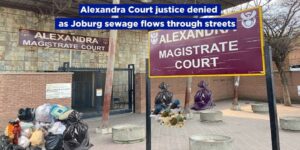Tyres, old clothes, shoes, building rubble, rags, newspaper, nappies, feminine hygiene products, condoms, wet wipes, animal carcasses, food waste and hardened cooking fats are among the items that are found illegally dumped into our sewer system, which is causing the majority of about 300 sewer overflows city-wide a day.
During 2020, the City’s Water and Sanitation Department cleared approximately 122 000 sewer blockages across Cape Town. Approximately 75% of these cases are the result of misuse of the sewer system.
The City spent approximately R350 million last year specifically due to misuse of the system. This is expenditure which can be avoided through improved awareness and education, and gradual behaviour change.
‘We want to thank our essential frontline water and sanitation teams who have been working hard and diligently, even throughout lockdown, often facing very challenging and obstructive circumstances, to ensure they clear the blockages as soon as possible and repair or replace our infrastructure, where needed, so that residents can have a healthy environment.
‘It hasn’t always been easy as there were times when protest action prevented maintenance teams from accessing areas or illegally erected structures were built over the City’s infrastructure, preventing them from attending to sewer blockages. Sometimes our staff are also targeted by opportunistic criminals while on site, carrying out the work. Regardless of these challenges, they attended to and cleared just over 122 000 sewer blockages last year, which needs to be commended,’ said the City’s Mayoral Committee Member for Water and Waste, Alderman Xanthea Limberg.
Illegal dumping into our sewer system is a major contributor to blockages, as well as many people’s daily habits of disposing of their waste in toilets, and down sinks and drains instead of in bins or refuse bags for collection.
Illegal discharge of stormwater (i.e. from rain gutters) into sewers also contributes to overflows by overloading the capacity of the pipes, particularly during heavy rainfall. Residents must please ensure that these rain gutters/downpipes and surface runoff on their property flow into storm drains, not into the sewers.
‘The City will continue to respond to these service requests and clear blockages as quickly as we can, but meaningful improvement and reduction in overflows requires a shift in behavior and habits in society. We all need to be much more conscious of what we flush down the toilets. Currently, too many of our limited resources are being used to respond to the consequences of illegal behaviour.
Common causes of blockages include:
- rags
- newspapers
- feminine hygiene products
- nappies
- wet wipes
- building materials/rubble
The problems are compounded when high levels of cooking fat/oil enter the system.
‘When fats/oils are poured or flushed down the sink and drain, they harden and build up on the inside of the sewer pipes and act like glue, attracting rags, hair, paper, plastics and other debris. The hardness of these blockages can also make them very difficult to clean out. We encourage residents to please dispose of these items appropriately using the refuse removal services and City drop off sites, where applicable,’ said Alderman Limberg.
Residents are reminded of the following:
- Please ensure that rain gutters and downpipes and surface runoff on your property flows into stormwater drains in the street rather than sewers.
- Only human waste, toilet paper, and cleaning detergent should be flushed down the toilet. Everything else- rags, cooking oil/ fats, newspapers, feminine hygiene products, condoms, nappies, wet wipes and building materials- needs to disposed of via the appropriate solid waste services that are provided by the City. Flushing anything apart from human waste and toilet paper is illegal in terms of the Wastewater and Industrial Effluent By-law.
- Manholes should not be used for dumping/waste disposal. These should remain closed as they are only used for inspection and maintenance purposes.
Some tips for residents:
- Put a strainer in the sink to catch food or other waste before it goes down the drain and creates blockages.
- Wipe cooking fats, oil or grease off the pan, and don’t pour it down the drain.
- Don’t flush nappies and sanitary products, they absorb water and expand, which causes blockages.
- Check that rainwater gutters don’t flow into the sewer system, as it overloads
- Visit the City’s drop-off facilities to dispose of recyclables, electronics, garage waste and builder’s rubble
The City conducts education and awareness campaigns about illegal dumping into the sewer system, including our Bin it, Don’t Block It Campaign. (The leaflets are available in English, Afrikaans and Xhosa.)
‘We appeal to residents and community leaders to use the available resources on the City’s website to join in efforts to raise awareness. At the end of the day, the City cannot practically police what residents flush down the toilet or wash down their sinks, so it is up to communities to take responsibility. Let us work together to prevent sewer overflows.
‘We also want to thank residents who are reporting sewer overflows and blockages as soon as they are noticed to ensure sewers are unblocked as quickly as possible. There may be instances, such as protest action, that may impact on the City’s response to service requests, as staff may need to be withdrawn from an area if their safety is at risk or the vehicles they travel in are targeted by opportunists.
‘In such cases, we want to assure our residents that every effort will be made to attend to their water and sanitation service requests as soon as possible and as soon as the area is deemed safe for our staff to enter,’ said Alderman Limberg.
Residents need to bear in mind that when there is heavy rains, there tends to be an increase in service requests which may extend the response time.
Residents are encouraged to use one of the channels available to log a service request:
(Please provide the street address, and get a reference number)
- Online www.capetown.gov.za/servicerequests
- Email water@capetown.gov.za
- SMS 31373 (maximum 160 characters. Standard rates apply)
- Call 0860 103 089
- Visit a City walk-in centre (see www.capetown.gov.za/facilities to find the one closest to you)




